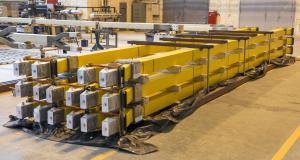70 tonnes of switching network components from Russia
The shipment, which left Saint Petersburg on 5 December for a first stop in Kiel, Germany, includes direct current aluminium busbars for the poloidal field coils, correction coils and central solenoid; busbar thermal expansion absorbers; and other DC busbar components. Busbars—the components that connect the superconducting magnets with their power supply—are capable of carrying 70kA of current.
The switching networks for ITER's coil power supplies will trigger the pulses in the circuits of the central solenoid and poloidal field coil numbers 1 and 6 for the initiation of the plasma. The fast discharge units are used to protect the superconducting coils in case of a quench (a sudden loss of superconductivity). All components for these systems are under development at the Efremov Institute (NIIEFA) in St. Petersburg, which has world-recognized expertise in this area.
The fabrication and supply of switching equipment, busbars and energy absorbing resistors for power supply and protection of the superconducting magnetic system is the most expensive—and one of the most complicated—of the 25 systems falling within the scope of Russia's procurement responsibility. According to the terms of the Procurement Arrangement signed in 2011, the Efremov Institute will manufacture and deliver approximately 5.4 km of busbars with a total weight exceeding 500 tonnes.
The shipment that is on the way will be the second delivery of switching network equipment to ITER from Russia.


